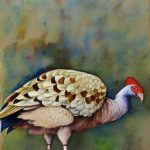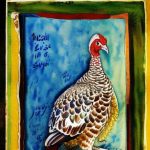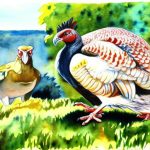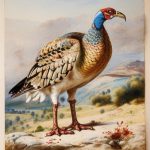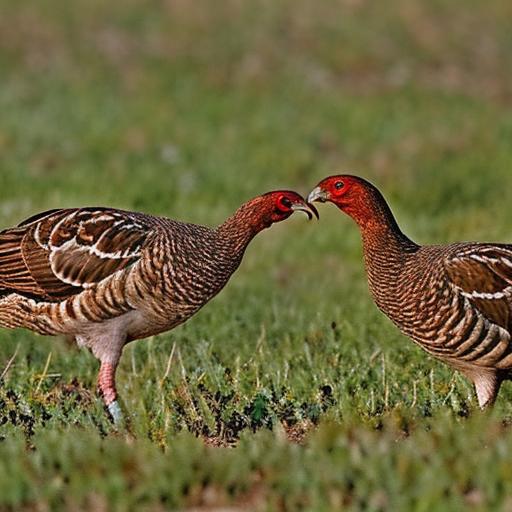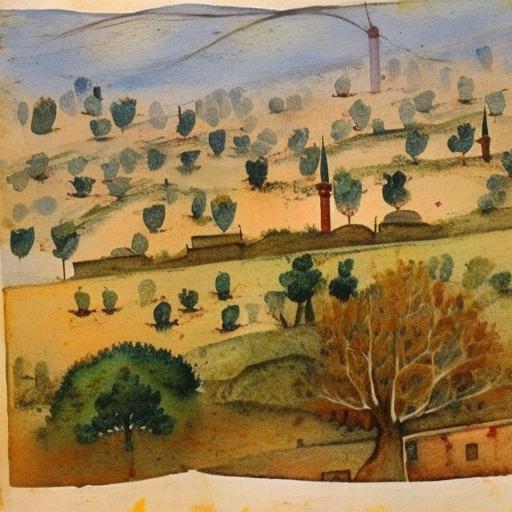Turkey breeding is a crucial aspect of wildlife conservation and management. Turkeys are an important part of the ecosystem, playing a key role in controlling insect populations and spreading seeds through their droppings. Additionally, turkeys are a popular game species, attracting hunters and outdoor enthusiasts to the wilderness. As such, it is essential to ensure the sustainable breeding and management of turkey populations to maintain a healthy ecosystem and provide recreational opportunities for hunters.
In the wild, turkeys face numerous challenges to their survival, including habitat loss, predation, and disease. By focusing on turkey breeding, wildlife managers can help bolster turkey populations and ensure their long-term viability. This involves monitoring turkey populations, protecting their habitats, and implementing conservation measures to support their breeding success. Without these efforts, turkey populations could decline, leading to negative impacts on the ecosystem and the loss of recreational opportunities for hunters.
Turkey breeding also plays a vital role in maintaining biodiversity. As a keystone species, turkeys have a significant impact on the environment, influencing the behavior of other species and contributing to the overall health of the ecosystem. By promoting turkey breeding, conservationists can help preserve the natural balance of the ecosystem and protect the diversity of wildlife species that depend on turkeys for food and habitat. In this way, turkey breeding is not only important for the survival of turkeys themselves but also for the broader conservation efforts aimed at preserving the natural world.
Table of Contents
- 1 The Role of Hunting in Turkey Population Management
- 2 Conservation and Turkey Breeding
- 3 The Ethics of Hunting Turkeys
- 4 The Economic Impact of Turkey Hunting
- 5 The Cultural and Historical Significance of Turkey Hunting
- 6 Alternatives to Turkey Hunting for Conservation and Population Management
- 7 FAQs
- 7.1 Why hunt turkeys when breeding?
- 7.2 Is it legal to hunt turkeys during breeding season?
- 7.3 What are the potential benefits of hunting turkeys during breeding season?
- 7.4 Are there any potential drawbacks to hunting turkeys during breeding season?
- 7.5 How can hunting turkeys during breeding season be done responsibly?
Key Takeaways
- Turkey breeding is important for maintaining healthy populations and genetic diversity.
- Hunting plays a role in managing turkey populations and preventing overpopulation.
- Conservation efforts are crucial for protecting turkey habitats and ensuring sustainable breeding.
- Ethical hunting practices are important for maintaining a balance between population management and animal welfare.
- Turkey hunting has a significant economic impact, contributing to local economies and supporting conservation efforts.
- Turkey hunting has cultural and historical significance, with traditions and practices that have been passed down through generations.
- Alternatives to hunting, such as habitat restoration and predator control, can also be effective for conservation and population management.
The Role of Hunting in Turkey Population Management
Hunting plays a crucial role in turkey population management, helping to control turkey numbers and prevent overpopulation. Without hunting, turkey populations can grow unchecked, leading to increased competition for resources, habitat destruction, and negative impacts on other wildlife species. By allowing regulated hunting, wildlife managers can help maintain healthy turkey populations and prevent ecological imbalances.
Hunting also provides an important source of data for wildlife managers, allowing them to monitor turkey populations and make informed decisions about population management strategies. Through hunting regulations and harvest reporting requirements, wildlife agencies can gather valuable information about turkey populations, including population size, age structure, and sex ratios. This data is essential for developing effective management plans that ensure sustainable turkey populations and healthy ecosystems.
Furthermore, hunting can help reduce human-wildlife conflicts by managing turkey populations in areas where they may cause damage to crops or property. By allowing hunters to harvest turkeys in these areas, wildlife managers can mitigate conflicts and promote coexistence between humans and wildlife. Overall, hunting plays a critical role in turkey population management, providing valuable data for conservation efforts and helping to maintain balanced ecosystems.
Conservation and Turkey Breeding
Conservation efforts are essential for the sustainable breeding of turkeys and the preservation of their habitats. Habitat loss and degradation are significant threats to turkey populations, as they rely on diverse and healthy ecosystems for breeding and survival. Conservation initiatives aimed at protecting and restoring turkey habitats are crucial for ensuring the long-term viability of turkey populations.
In addition to habitat conservation, efforts to reduce human-wildlife conflicts are also important for turkey breeding. By implementing measures to minimize disturbances to turkey habitats and reduce mortality from human activities, conservationists can create safer environments for turkeys to breed and raise their young. This may include managing human access to sensitive areas during breeding seasons and reducing the impact of development on turkey habitats.
Conservation efforts also play a key role in addressing other threats to turkey populations, such as predation and disease. By implementing predator management programs and monitoring disease outbreaks, wildlife managers can help reduce mortality rates among turkeys and support their breeding success. Overall, conservation efforts are essential for protecting turkey habitats, reducing human-wildlife conflicts, and addressing other threats to turkey populations, ultimately supporting their breeding and long-term survival.
The Ethics of Hunting Turkeys
The ethics of hunting turkeys is a complex and nuanced issue that involves considerations of animal welfare, ecological sustainability, and cultural traditions. While some people may view hunting as unethical due to concerns about animal suffering, others argue that hunting can be conducted in a humane and sustainable manner that supports conservation efforts and respects the natural world.
From an ethical standpoint, many hunters emphasize the importance of fair chase principles in hunting turkeys. This involves pursuing turkeys in a manner that allows them a reasonable chance to escape, respecting their natural instincts and behaviors. By adhering to fair chase principles, hunters can ensure that their actions are ethical and respectful of the animals they pursue.
Furthermore, hunting can be seen as a way to connect with nature and participate in the cycle of life and death. For many hunters, harvesting a turkey is a deeply meaningful experience that fosters a sense of gratitude for the natural world and an appreciation for the food it provides. This perspective emphasizes the ethical dimensions of hunting as a way to engage with the environment in a respectful and responsible manner.
At the same time, it is important for hunters to consider the ecological impact of their activities and ensure that they are contributing to sustainable population management. By following hunting regulations, practicing selective harvesting, and supporting conservation efforts, hunters can play a role in maintaining healthy turkey populations and balanced ecosystems. Ultimately, the ethics of hunting turkeys involve careful consideration of animal welfare, ecological sustainability, and cultural traditions.
The Economic Impact of Turkey Hunting
Turkey hunting has significant economic implications, contributing to local economies through expenditures on hunting equipment, travel, accommodations, and related services. As a popular outdoor activity, turkey hunting attracts hunters from across the country who spend money on licenses, permits, gear, and other expenses associated with their hunting trips. This influx of spending supports local businesses and stimulates economic growth in rural communities where turkey hunting is prevalent.
In addition to direct expenditures by hunters, turkey hunting also generates revenue for state wildlife agencies through license sales and excise taxes on hunting equipment. These funds are essential for supporting wildlife conservation efforts, habitat restoration projects, and other initiatives aimed at preserving natural resources and wildlife habitats. As such, turkey hunting plays a critical role in funding conservation programs that benefit not only turkeys but also a wide range of other wildlife species.
Furthermore, the economic impact of turkey hunting extends beyond direct expenditures to include indirect benefits such as job creation and tourism development. Hunting-related businesses, including outfitters, guides, lodges, and restaurants, provide employment opportunities and contribute to the overall economic vitality of rural communities. Additionally, the presence of hunting opportunities can attract tourists to areas with abundant turkey populations, further stimulating local economies through increased visitation and spending. Overall, turkey hunting has a substantial economic impact that supports local businesses, generates revenue for conservation efforts, and contributes to the economic well-being of rural communities.
The Cultural and Historical Significance of Turkey Hunting

Turkey hunting holds deep cultural and historical significance in many societies, reflecting longstanding traditions and connections to the natural world. For indigenous peoples in North America, turkeys have played a central role in cultural practices and ceremonies for centuries. The act of hunting turkeys has been intertwined with spiritual beliefs and traditional customs that honor the natural world and express gratitude for the sustenance provided by turkeys.
In addition to indigenous traditions, turkey hunting has been an integral part of American history since colonial times. Early settlers relied on wild turkeys as a vital food source and developed hunting techniques that have been passed down through generations. As such, turkey hunting has become deeply ingrained in American culture, symbolizing a connection to the land and a respect for wildlife that has endured over time.
Furthermore, turkey hunting has inspired artistic expressions in literature, music, and visual arts that celebrate the beauty of nature and the thrill of the hunt. From classic hunting stories to iconic paintings depicting wild turkeys in their natural habitats, the cultural significance of turkey hunting is evident in its portrayal across various forms of artistic representation.
Overall, turkey hunting holds cultural and historical significance that reflects enduring connections to nature, traditional practices, and artistic expressions. These cultural dimensions contribute to the rich tapestry of human experiences with wildlife and underscore the importance of preserving traditions that honor the natural world.
Alternatives to Turkey Hunting for Conservation and Population Management
While hunting plays a significant role in conservation and population management efforts for turkeys, there are alternative approaches that can complement or substitute for hunting in certain contexts. These alternatives may include non-lethal methods of population control, habitat restoration projects, public education initiatives, and community-based conservation programs that engage local stakeholders in wildlife management efforts.
One alternative approach to turkey hunting is the implementation of non-lethal population control methods such as fertility control measures or relocation programs. These methods aim to manage turkey populations without relying on hunting as the primary means of population control. While these approaches may be more challenging to implement on a large scale or in certain environments, they offer potential alternatives for managing turkey populations in areas where hunting may not be feasible or desirable.
Habitat restoration projects also offer alternative strategies for supporting turkey populations by improving their breeding habitats and addressing threats to their survival. By restoring degraded habitats, conserving critical landscapes, and creating wildlife corridors, conservationists can help bolster turkey populations without relying solely on hunting as a management tool.
Public education initiatives that raise awareness about the importance of turkeys in ecosystems can also contribute to conservation efforts by fostering greater appreciation for these birds and promoting coexistence between humans and wildlife. By engaging communities in conservation programs that emphasize the value of turkeys as part of healthy ecosystems, conservationists can build support for protecting these birds without solely relying on hunting as a means of population management.
Community-based conservation programs that involve local stakeholders in wildlife management efforts can also provide alternative approaches to supporting turkey populations while addressing human-wildlife conflicts. By collaborating with landowners, farmers, hunters, and other community members, conservationists can develop innovative strategies for conserving turkey habitats and promoting sustainable coexistence with these birds.
In conclusion, while hunting plays an important role in turkey population management and conservation efforts, there are alternative approaches that can complement or substitute for hunting in certain contexts. By considering non-lethal population control methods, habitat restoration projects, public education initiatives, and community-based conservation programs as part of comprehensive wildlife management strategies, conservationists can support sustainable turkey populations while addressing human-wildlife conflicts and promoting coexistence between humans and wildlife.
If you’re passionate about raising poultry, you may be interested in learning about the benefits of turkey hunting while also breeding turkeys. In a related article on PoultryWizard, you can explore the importance of providing a safe and comfortable environment for your chickens with tips on building a chicken coop in Chester, SC. Understanding the needs of your poultry and creating a suitable habitat for them is essential for successful breeding and hunting experiences. Check out the article here to gain valuable insights into creating an ideal space for your feathered friends.
FAQs
Why hunt turkeys when breeding?
Hunting turkeys during breeding season can help control the population and prevent overpopulation, which can lead to habitat destruction and food scarcity for the turkeys.
Is it legal to hunt turkeys during breeding season?
Laws and regulations regarding hunting turkeys during breeding season vary by location. It is important to check local hunting regulations and obtain the necessary permits before hunting turkeys.
What are the potential benefits of hunting turkeys during breeding season?
Hunting turkeys during breeding season can help manage the population, reduce crop damage, and provide opportunities for wildlife management and conservation efforts.
Are there any potential drawbacks to hunting turkeys during breeding season?
Hunting turkeys during breeding season can potentially disrupt the breeding behavior and impact the overall population if not managed properly. It is important to consider the potential impact on the turkey population and ecosystem before hunting during breeding season.
How can hunting turkeys during breeding season be done responsibly?
Responsible hunting practices, such as following hunting regulations, using ethical hunting methods, and considering the impact on the turkey population and ecosystem, can help ensure that hunting turkeys during breeding season is done in a sustainable and responsible manner.
Meet Walter, the feathered-friend fanatic of Florida! Nestled in the sunshine state, Walter struts through life with his feathered companions, clucking his way to happiness. With a coop that’s fancier than a five-star hotel, he’s the Don Juan of the chicken world. When he’s not teaching his hens to do the cha-cha, you’ll find him in a heated debate with his prized rooster, Sir Clucks-a-Lot. Walter’s poultry passion is no yolk; he’s the sunny-side-up guy you never knew you needed in your flock of friends!


